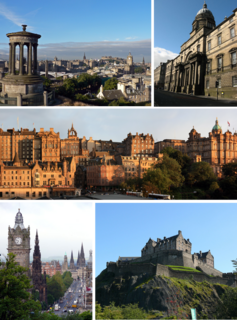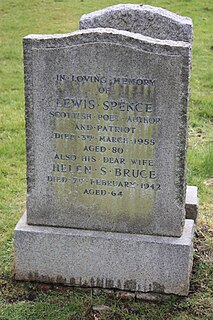The Scottish National Movement (SNM) was a political organisation which campaigned for Scottish independence in the 1920s. It amalgamated with other Scottish nationalist bodies in 1928 to form the National Party of Scotland. [1]
Scottish independence is the political movement for Scotland to become a sovereign state independent from the United Kingdom.

Scottish nationalism promotes the idea that the Scottish people form a cohesive nation and national identity and is closely linked to the cause of Scottish home rule and Scottish independence, the ideology of the Scottish National Party, the party forming the Scottish Government. In recent years it has shifted to civic nationalism rather than ethnic nationalism.
The National Party of Scotland (NPS) was a centre-left political party in Scotland which was one of the predecessors of the current Scottish National Party (SNP). The NPS was the first Scottish nationalist political party, and the first which campaigned for Scottish self-determination.
A breakaway from the Scots National League, the SNM was a small, Edinburgh-based group led by Lewis Spence. Like Spence, its followers were mainly literary figures evincing a romantic, nostalgic nationalism typical of the period. The SNM aimed to re-establish a Scottish Parliament and an independent state within the British Empire. As a matter of tactics, it gave its support to any measure directed towards Home Rule. It was active in the negotiations from which the National Party of Scotland emerged, and into which the SNM merged.
The Scots National League (SNL) was a political organisation which campaigned for Scottish independence in the 1920s. It amalgamated with other Scottish nationalist bodies in 1928 to form the National Party of Scotland.

Edinburgh is the capital city of Scotland and one of its 32 council areas. Historically part of the county of Midlothian, it is located in Lothian on the Firth of Forth's southern shore.

James Lewis Thomas Chalmers Spence was a Scottish journalist, poet, author, folklorist and occult scholar. Spence was a Fellow of the Royal Anthropological Institute of Great Britain and Ireland, and Vice-President of the Scottish Anthropological and Folklore Society. He founded the Scottish National Movement.




